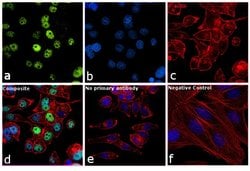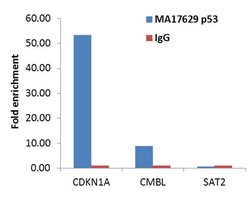Learn More
Invitrogen™ p53 Monoclonal Antibody (BD53-12)
Description
MA1-7629 detects p53 from human, rat and mouse samples. MA1-7629 has been successfully used in ELISA, fluorescent microscopy, flow cytometry, immunoprecipitation and immunohistochemistry (frozen) procedures. The MA1-7629 immunogen is a p53 protein.

Specifications
Specifications
| Antigen | p53 |
| Applications | ChIP Assay, ELISA, Flow Cytometry, Immunohistochemistry (Frozen), Immunomicroscopy, Immunoprecipitation, Immunocytochemistry |
| Classification | Monoclonal |
| Clone | BD53-12 |
| Concentration | 1 mg/mL |
| Conjugate | Unconjugated |
| Formulation | PBS with 0.01% sodium azide; pH 7.2 |
| Gene | Tp53 |
| Gene Accession No. | P02340, P04637, P10361 |
| Gene Alias | Antigen NY-CO-13; bbl; BCC7; bfy; bhy; cellular tumor antigen p53; Cys 51 Stop; EGK_08142; FLJ92943; HGNC11998; I79_002739; LFS1; Li-Fraumeni syndrome; mutant p53; mutant tumor protein 53; OTTMUSP00000006194; p44; p53; p53 cellular tumor antigen; p53 protein; p53 tumor suppressor; p53 tumor suppressor phosphoprotein; phosphoprotein p53; Tp53; tp53.L; transformation related protein 53; transformation-related protein 53; Trp248; Trp53; tumor protein 53; tumor protein p53; tumor protein p53 (Li-Fraumeni syndrome); tumor protein p53 L homeolog; tumor suppressor p53; tumor suppressor p53 phosphoprotein; tumor suppressor protein p53; tumor supressor p53; Tumour Protein p53; XELAEV_180196761mg; Xp53; Xrel3 |
| Show More |
By clicking Submit, you acknowledge that you may be contacted by Fisher Scientific in regards to the feedback you have provided in this form. We will not share your information for any other purposes. All contact information provided shall also be maintained in accordance with our Privacy Policy.



